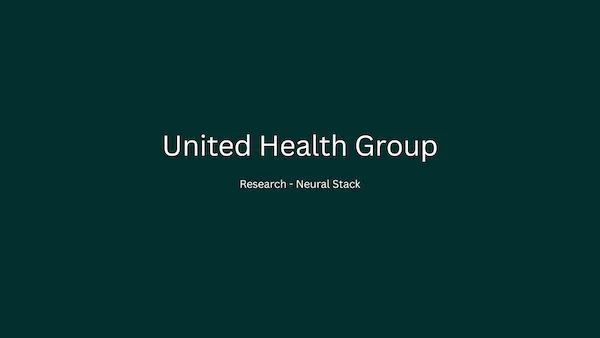Is United Overvalued?

Investment Thesis
UnitedHealth Group presents a rare opportunity to buy a dominant, cash-generative healthcare leader at a significant discount—offering substantial upside if regulatory and reputational headwinds subside.
Overview
Company Snapshot
Ticker: $UNH
Sector: Health Care Providers & Services
Founded: 1974
CEO: Stephen J. Hemsley (as of May 2025)
Market Cap: ~$255B
Current Share Price: $281
Annual Revenue: $410B (2024)
Growth Metrics
Revenue Growth
11% CAGR since 2015, with acceleration to 12% CAGR over the past 3 years.
8% YoY revenue growth in the latest fiscal year despite mounting sector headwinds.
Segment Breakdown
UnitedHealthcare: 74% of revenue, 5.3% operating margin.
Optum: 25% of revenue, but contributes 50%+ of operating income due to a higher 16.8% margin.
Optum is UnitedHealth's long-term growth engine. Since 2012:
Optum revenue: 25% CAGR
UnitedHealthcare: 9% CAGR
EPS & Free Cash Flow
EPS grew at 11% CAGR since 2015, including 19% CAGR between 2015 and 2023.
However, EPS dropped 35% in 2024 due to a cyberattack on Change Healthcare.
FCF followed a similar trajectory: 11% CAGR over the decade, despite a 17% YoY decline in the most recent year.
Context- collapse
From its all-time high of $630 in November 2024, shares have plunged 55%, erasing five years of gains. UNH is down 44% YTD—the worst performer in the Dow Jones Industrial Average. Key events behind the collapse:
1. CEO Assassination (Dec 2024)
The shocking assassination of UnitedHealthcare CEO Brian Thompson led to a 21% drop in shares. Though the stock rebounded, investor confidence was damaged.
2. Q1 2025 Earnings Miss
First miss since 2008.
EPS of $7.20 vs. $7.29 expected.
Driven by Medicare Advantage utilization spike and reimbursement headwinds at Optum.
3. CEO Resignation & Guidance Withdrawal
CEO Andrew Witty resigned in May 2025.
Guidance for 2025 was withdrawn, citing unpredictable care utilization trends.
4. Criminal Medicare Fraud Investigation
DOJ launched a criminal probe into Medicare Advantage billing practices.
Allegations include aggressive upcoding, controversial incentive structures, and possible overpayments.
5. Policy Risk: “One Big Beautiful Bill”
Introduced stricter billing oversight, spending cuts, and prior authorization reform.
Directly impacts Medicare Advantage economics.
6. Financial Engineering Concerns
Bloomberg reported quiet sales of internal business stakes to private equity to boost earnings.
Raises transparency concerns.
7. Employer Cost-Shifting Pressure
Rising premiums are prompting employers to reduce benefits or seek cheaper coverage—potentially eroding UnitedHealth’s top line.
The Bull Case
1. Allegations May Prove Overblown
In March 2025, a special master recommended dismissal of a whistleblower case alleging $2B in improper diagnosis coding.
UnitedHealth reaffirmed its practices have been validated by CMS audits.
It has committed to independent third-party oversight for added transparency.
2. Not Just a UNH Problem
Elevance and Centene have also cut guidance or withdrawn forecasts.
Broader MA (Medicare Advantage) pressures are driving down the entire sector.
Healthcare is trading at a 30-year low relative to the S&P 500 (per Goldman Sachs).
3. Drug Denial Rates Are Sector-Wide
UnitedHealth's denial rate (~23%) is consistent with industry averages.
Most rejected claims are ultimately approved after review.
4. Operational Adjustments
Raised medical cost ratio guidance to 87.5% to better price 2026 plans.
Reduced broker commissions to manage Medicare Advantage enrollments.
Exploring a $1B Latin America divestiture to sharpen focus on core U.S. operations.
5. 2026 Medicare Advantage Rate Increase
CMS approved a 5.06% rate hike for 2026—more than double initial expectations.
Provides a meaningful tailwind to both revenue and margins.
6. Veteran CEO Returns
Stephen Hemsley, who led UNH from 2006–2017, has returned as CEO.
His tenure saw robust growth and resilience through the GFC.
Reinstatement signals board confidence and a strategic reset.
7. Insider & Congressional Buying
May 2025:
Hemsley purchased $25M worth of shares at ~$289.
CFO John Rex bought $5M.
Members of Congress (e.g., Marjorie Taylor Greene) disclosed purchases.
8. Structural Resilience
UNH’s U.S.-centric model insulates it from tariffs, geopolitical shocks, and FX volatility.
Healthcare demand is inelastic, offering downturn resistance.
9. Capital Return
Dividend Yield: 3.2% (highest in over a decade).
Dividend Growth: 18% CAGR since 2015.
Buybacks: $9B in 2024 alone, boosting EPS and supporting the stock.
